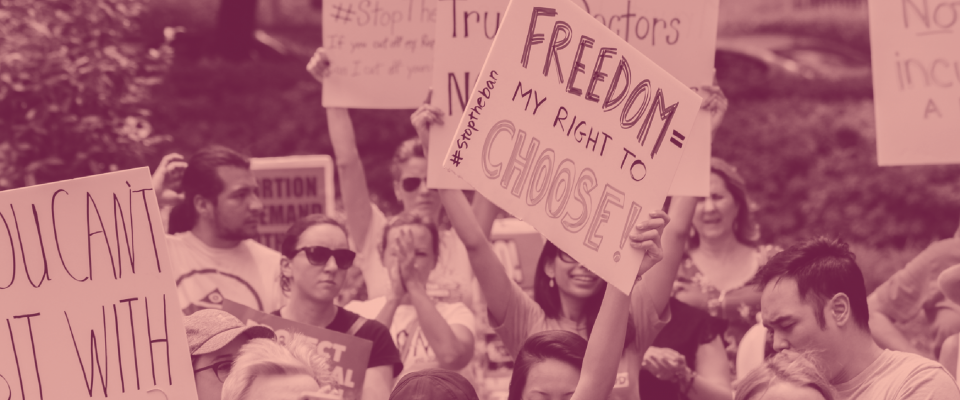Voices boomed across downtown Dallas, echoing off the skyscrapers. People filled the streets, usually packed with cars on a sweltering Saturday afternoon, waving signs and chanting. Led by two local reproductive justice organizations, Tea Fund and the Afiya Center, these protestors joined thousands in 660 demonstrations across the country on October 2nd to march against Texas’ new anti-abortion law, Senate Bill 8 (SB8).
What is SB8?
Passed by nearly all Republicans in the 2021 Texas Legislative session, SB8 is the most restrictive abortion law in the country. It bans all abortions after 6 weeks of pregnancy without any exceptions, including rape and incest. SB8 hinges on two important concepts: the fetal heartbeat and the private individual enforcement mechanism.
Nicknamed the Heartbeat Bill by conservatives, this law prohibits patients from obtaining an abortion when the ultrasound can hear the “fetal heartbeat,” a term coined by lawmakers and rarely used by medical professionals. The term is misleading for two reasons. First of all, a fetus doesn’t actually exist until approximately 8 weeks into a pregnancy; the correct term is an embryo. Experts speculate anti-abortion advocates use “fetus” incorrectly to “evoke images of babies,” generating a more powerful emotional response from their supporters. Second of all, a heartbeat cannot physically happen until much later in fetal development. A person’s heartbeat is defined by sound caused by the opening and closing of their heart valves. However, heart valves have not developed by the 6 week limit specified in the ban. The sound that the ultrasound machine makes when the embryo is 6 weeks old is not the “fetal heartbeat” that lawmakers claim, but actually electrical activity that the ultrasound machine creates. Providers cannot hear the fetal heartbeat until the fetus reaches 10 weeks. The application of SB8 lacks medical accuracy and instead leans on anti-abortion ideology.
The second part of SB8, the private individual enforcement clause, prevents the court from striking the bill down. SB8 technically isn’t enforced by the state; instead any individual can sue a provider or anyone helping someone seek an abortion for $10,000 if they suspect SB8 has been violated. The private legal actions effectively evade constitutional rule and go around Roe v. Wade, the 1973 court case that ruled against state interference in abortions up to 12 weeks of pregnancy. Because SB8 is the first bill to have this type of enforcement, Texas is the first state to actually enforce such a restrictive abortion ban. Additionally, plaintiffs can win $10,000 and get their legal fees reimbursed, but defendants, anyone accused of helping someone get an abortion after 6 weeks, are not afforded the same rights. This allows for anti-abortion advocates to potentially sue abortion providers out of business and largely acts as an intimidation tactic, preventing people from contacting abortion providers and organizations out of fear of legal retaliation.
How does SB8 affect Texans and the rest of the country?
Labeled as a “full on abortion ban disguised as a limitation,” SB8 affects about 85% of abortions in Texas. Under the 6-week ban, pregnant people only have about one week to realistically get an abortion. Pregnancies actually start from the beginning of a person’s last period, leaving a very small window of a few days to 2 weeks for a person to realize they are pregnant. To get 2 weeks of notice, people would need to have regular periods and watch their periods closely. Additionally, the ultrasound can only detect cardiac or electrical activity near the end of 6 weeks. If a person realized they were pregnant in time, getting an abortion is another ordeal. Someone seeking an abortion has to schedule two appointments with an abortion provider due to the mandatory 24-hour waiting period between a consultation and the actual abortion procedure. Texas already lacks an adequate amount of abortion providers, so people often have to travel hundreds of miles to a clinic if their city doesn’t have a reproductive health clinic. This ultimately means people have to take days off work, which many people can’t afford to do without suffering a financial blow, and pay for travel and lodging costs on top of abortion fees. Due to these logistical restrictions, only people with reliable access to wealth, education, and healthcare can possibly get an abortion before 6 weeks.
Lilith Fund, an organization that supplies financial assistance for people seeking abortions, provides a snapshot of the people most affected by SB8. In 2020, about 75% of their clientele were people of color, 60% had children, 50% were not currently receiving income, and more than 40% were uninsured. The abortion fund also noted that out-of-state abortions for people past 6 weeks would cost them approximately 2.5 times more, which includes lodging, transportation, and abortion fees.
People can self-manage their abortion if needed, but cannot buy the abortion pills (mifepristone and misoprostol) through the mail after 7 weeks into their pregnancy due to SB4, a bill signed earlier this September. Many people cross the border to get abortion pills in Mexico, but because the medication is often bought outside of medical settings, consumers are not instructed on how to properly take the medication. They can miss crucial information about how many pills to take and during what time period. Lack of medical supervision can lead to complications or ineffective abortions, but complications are unlikely if a person does their own research. However, only American citizens or people with visas can cross the Texas-Mexico border for abortion pills. Undocumented people in America are not afforded this option.
Abortion clinics in Texas’ border states, including Oklahoma, Louisiana, New Mexico, and Colorado, are experiencing a huge influx of Texas residents escaping SB8. By early September, the closest reproductive care clinic for people in north Texas, Trust Women’s clinic in Oklahoma City, was booked three weeks into the September. Residents also flock to Louisiana’s only open abortion clinic with the other two closed due to damages from Hurricane Ida. Even Kansas, not technically a border state and the farthest away, has clinics starting to see patients from Texas.
However, Texas residents may lose these states as an option for abortion care. Legislators in other conservative-leaning states have filed similar bills after the courts let SB8 stand due to the individual enforcement clause. Florida was the first state to introduce their own “heartbeat law” in late September, and Arkansas, Idaho, South Dakota and Indiana have followed suit. A potential SB8-like law in Arkansas would drastically affect Texas residents’ access to abortion, forcing many to travel even greater distances to an abortion clinic or removing the option completely.
What’s next for SB8?
One of 50 anti-abortion bills introduced in the Texas Legislative session just this year, SB8 is part of a long history of the Texas government repressing the reproductive rights and bodily autonomy of their constituents. From 2013 to 2016, House Bill 2 reduced the number of abortion clinics from 40 to 19 by requiring them to have specific unnecessary hospital standards. The U.S. Supreme Court eventually struck the bill down, but not before Texans lost a significant chunk of abortion access. Similarly, Texas abortion clinics and organizations brought their case against SB8 up to the U.S. Supreme Court in hopes of the same outcome, but the court ruled 5-4 to allow the law to stand despite their questions about its constitutionality. The Justice Department also challenged Texas in a federal district court over SB8 to maintain Texans’ constitutional rights. A federal judge did overturn SB8, but the ruling was quickly dismissed the next day, allowing the 6-week ban to remain effective.
Many anti-abortion activists in Texas, including Texas Right to Life, are urging people to hold off on suing abortion providers under SB8 until the U.S. Supreme Court rules on Mississippi’s 15-week abortion ban. The hearings for Dobbs v. Jackson Women’s Health began on October 4th, and the conservative majority U.S. Supreme Court’s decision could render Roe v. Wade null, allowing SB8 to stand completely unchallenged and allow states to pass more restrictive abortion bans.
With the judicial branch in jeopardy, the federal government is trying to guarantee access to abortion through the legislative process. The Women’s Health Protection Act (WHPA) repeals many anti-abortion laws nationwide, including SB8, by making abortion access a “statutory right” for providers and their patients and by removing logistical and financial burdens to abortion care. Abortion organizations and healthcare providers are pushing for the U.S. Congress to approve the WHPA, but many doubt the bill will pass the Republican-majority Senate.
What can you do?
Protected abortion access in the U.S. is looking bleak, but here are a few things you can do:
- Learn more about abortion and who these abortion bans mainly affect: Abortion is one of the safest medical procedures, and there are different methods involved. One of the most common ways to get an abortion is through medication as disscussed earlier. Reading this article is the first step, but there are many other resources linked below that are worth checking out.
- Talk about abortion with your friends and family: Abortion is highly stigmatized in the U.S., but it doesn’t have to be. Sharing what you know or learning about abortion with loved ones helps counteract common misconceptions about abortion care and helps others know that they’re not alone if they ever need an abortion.
- Donate to abortion funds in Texas: Abortion funds help pay for the cost of obtaining an abortion, including traveling and lodging fees. Some may pay for the actual abortion, but most mainly contribute logistical funds. They also offer free advice over the phone regarding abortion care.
Texas abortion funds:
- Jane’s Due Process
- Texas Equal Access Fund
- Frontera Fund
- West Fund
- Buckle Bunnies
- Support Your Sistahs Fund
- Lilith Fund
- Fund Texas Choice
- Bridge Collective
- Clinic Access Support Network
- Indigenous Women Rising
- National Abortion Federation
- Planned Parenthood
- Whole Women’s Health
- Women’s Reproductive Rights Assistance Project (WRRAP)
Additional Links:



